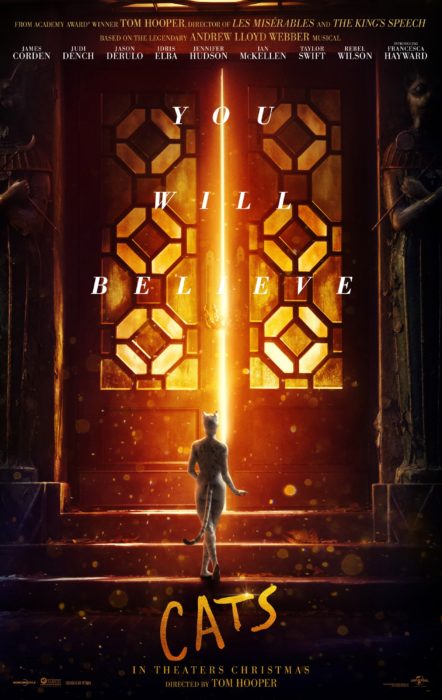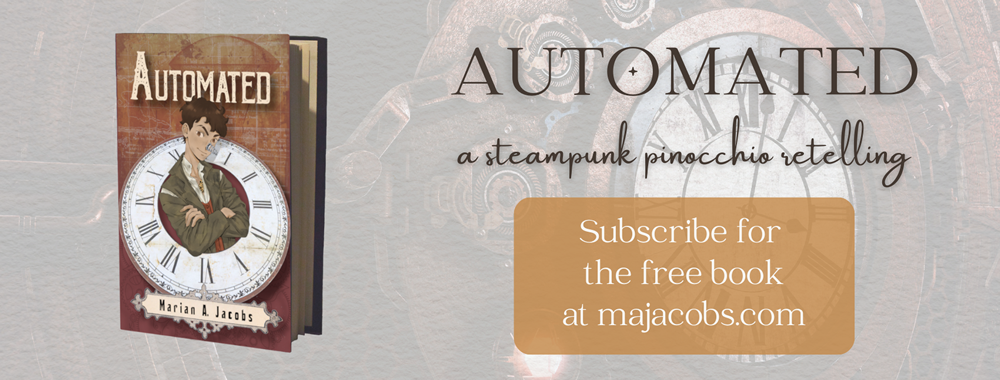‘Cats’ Gives Musical Fans a Dreamy Experience, But the Message is a Hot Mess
On the eve of December 20, many of my friends were out watching Star Wars: Rise of Skywalker. But where was I? Seeing Cats instead.
Before I was a sci-fi nerd, I was a singer. And then an actress. And then a theater major. I’ve made the choice to shelve the stage life during my children’s little years. But when I watch a musical on TV or have the pleasure of seeing one on stage, I can barely sit still. I feel like Quicksilver from X-Men—all twitchy and ready to jump in at any moment.
For me, watching Cats was (mostly) dreamy and euphoric. The sets were gorgeous, the performances perfection. I especially liked that they deepened the plot and raised the stakes. I could have gone without Rebel Wilson and James Corden as they didn’t match the feel of the film, but those are minor infractions in the grand scheme of things. Not to mention this new version is legit fantasy now since they added a magical villain and gave Mr. Mistoffelees real magic as well.
But—truth be told, the message in this story is a hot mess.
The good and bad within the songs and goals resembles a jumbled plate of spaghetti. I’m going to attempt to disentangle its pieces, but someone will probably walk away from this review thinking, “That’s not what that song meant!”
One cat’s quest: an idolatrous yet sympathetic desire for happiness
The basic, spoiler-free plot is a group of “Jellicle” cats that introduce themselves through song to newcomer, Victoria (Francesca Hayward). Each cat who sings is throwing their name into the hat for a second life—eventually chosen by Old Deuteronomy (Judi Dench). Most cats are beloved by all with the exception of, Macavity (Idris Elba), and Grizabella (Jennifer Hudson). Much to everyone’s chagrin, Victoria takes a liking to the shunned Grizabella.
The first installment of Grizabella’s despairing song, “Memory” (one of the biggest Broadway hits of all time), tells of her past as a glamour cat and her present longing for her beautiful youth and happiness. What’s striking about this part of the story is how destitute and rejected she’s become over the years. Not only because she’s no longer accepted by the other cats, but because she seems to exist only on memories of past happiness and the thought that tomorrow the sun will rise again.
But in all this darkness, composer Andrew Lloyd Webber weaves one single ray of hope: “I must think of a new life, and I mustn’t give in.” While in the midst of longing for her past happiness and beauty, she has a sliver of hope for another life granted by the revered cat, Old Deuteronomy.
Grizabella’s story is not an easy one to understand, and its moral message is not straightforward. On the one hand, she has become destitute because she is no longer beautiful. It seems that was all that made her happy in life—vanity, a chasing after the wind (Ecclesiastes 1:14). On the other hand, she seems to be asking for love and acceptance by the other cats who hate her. And that is what makes the viewer sympathetic to her plight.
How does this hold up against the Bible? The Christian life should not be one of looking back at what we had, but of what we will have in eternity. Grizabella manages to do a little of both, but not very well. Cats such as Jennyanydots (Rebel Wilson) are only interested in continuing their happy life exactly as it is one more time.
An argument could be made that this is a beautiful story of new life, but that is only half of it. We first have to ask, “Is the rebirth into a second life spoken of in Cats the same kind that Christians look forward to?” I think not. It’s implied that the second life is one that will happen again on earth. Old Deuteronomy herself is said to have lived ninety-nine lives. It is also implied that the chosen cat will have a chance to live the best part of their life again. If anything, this resembles Buddhism more than Christianity.
Not to mention only one deserving cat gets this great gift. Yet the beauty of the gospel is that Christ died so the undeserving sinners of the world might live, not just one more life, but an eternal life of more happiness than we could ever dream of right now. Compared to such awesomeness, the gift offered in Cats is an ugly thing.
Only Jesus can fulfill the promise of freedom and joy
After the movie was over, I got in my car and turned on one of my favorite worship songs, “Bright As The Sun,” by Hillsong Worship. I was struck by the similarity in the language to the movie I’d just watched and the stark contrast of the messages:
“Now mine is the life You raised, yours the glory that took down that grave. Bright as the sun almighty in love, God forever Your Kingdom come. My heart burns wild in my chest in awe of Your heart in all that You are. Let Your praise run wild on my breath.”
Not only was the idea of new life and the rising sun mirrored, yet warped, in “Memory,” but my thoughts snagged even more on the idea of wildness. In the new song written by Andrew Lloyd Webber for the film, “Beautiful Ghosts,” Victoria says, “But I feel so alive with these phantoms of night. And I know that this life isn’t safe but it’s wild and it’s free.” For our society, wildness and freedom mean unbound by rules, tradition, and free to act outside of any moral norm. That is the kind of freedom often exhibited by these cats.
But for the Christian, “wild” implies an all-consuming passion and zeal for the Lord that desires to be set free from our mouths. That kind of freedom is loosed from the bondage of our depravity—our sin nature. Unlike society that idolizes freedom from God, the Christian prioritizes freedom to love and worship God apart from sin. It is wild insofar as the message of the gospel runs rampant from our lips. Not only that, but C. S. Lewis goes to far as to call Aslan wild: “He’s wild, you know. Not like a tame lion.”
So is there anything good in Cats? Absolutely! Even if the story wrongly elevates idols such as the past (Grizabella, Gus, etc.) and present (Jennyanydots, Bustopher Jones, etc.), it also shows moments of real beauty within the darkness—and it’s not just because the cast are all such great dancers. Victoria’s openness and loving attitude toward all the cats eventually endears her to lowly Grizabella. The affection during this reconciliation is powerful and moving in all the right ways. If only I could say more on this without giving away spoilers!
Are you planning to see Cats? I would love to hear your thoughts on the message, so drop a comment below!





































Are we just gonna skip past the uncanny valley staring from the abyss straight at you?
You took the words right out of my mouth, Notleia.
My thoughts exactly!
Interestingly enough, yesterday I just got through listening to a negative review of Cats. (The reviewer was mostly bored/felt like there wasn’t enough of a plot to it.) I probably won’t see it, though it takes a lot of circumstances lining up for me to end up seeing movies now days. From the commercials, I can see some interesting aspects and some things that were kind of strange.
Funny that they thought it had not plot. I think reviewers should go watch the original before critiquing the remake.
I have no interest in seeing it in theaters, but will probably watch it when it comes on TV or something just to see what I think of it. Thank you for breaking down the message of the movie. I had wondered about the whole “second life” thing.
Hi Marian,
I have to admit I don’t know the story, but I sure appreciate the contrasts you drew out.
First, between not looking back at what we had, or just trying to hang onto what we have, but looking forward to what we will have.
I believe this gives us the ability to be and grow and create what we are meant to at any given point, because when we take what He gives with trust (holding things we love the way they ought to be held) we acknowledge His good plan and character.
Second, the contrast between the false and ugly hope of Buddhism and the eternal life we look forward to, one free from all evil (especially in ourselves), with the One who created every good thing we enjoy in this life.
And third, between our societies’ desire for wildness and freedom, (meaning unbound by rules, tradition, and any moral norm) and our freedom from sin’s tyranny. This releases us to a goodness that appears wild as we are freed to become more ourselves as individuals then we ever were under the domination of our desires.
I love your reference to Aslan not being tame – God shatters most of our uneducated expectations about His nature and who He is.
It’s also lovely you can see the good in Grizabella’s reconciliation, yet also see the drawbacks of the story as a whole and express them so well. This kind of discernment is so needed among us Christians. It helps those who read what you wrote see the truth.
Thank you for your thoughtful article. I’m now intrigued and think I might like to see this story.
Have a great evening!
Azalea Dabill
Thank you! I hope you enjoy the film! It’s weird but fun!
I loved the book Old Possum’s Book of Practical Cats by T.S. Eliot. I liked the stage play–which is basically songs on a bare stage with minimal plot to string Eliot’s lyrics/Webber’s music together.
Yes, the costumes in the stage production were weird. But the CGI in the movie trailer is overwhelmingly grotesque. The human sized furniture accentuates the uncanny effect of the whole.
And the plot is as bizarre as anything Kafka wrote without the suspension of disbelief found in his fiction. If you’re going to have a plot that’s so surreal it’s best to avoid mentioning it too much.
In the original there was no real plot. There wasn’t meant to be one. Fans watched it for the singing and choreography.
Admittedly Cats is not everyone’s cup of tea. But it was mine and a few other weirdos’.
Cats should have stayed a stage play. The silver screen was not a good medium for this.
I would agree that they probably shouldn’t have made it a film. The target audience was far too narrow to warrant how much they spent making it. But I disagree that the CGI made it grotesque. I quite enjoyed that aspect.
This video had some very interesting and useful comments about the design choices to help fix some of the uncanny valley elements and whatnot: